The COVID-19 pandemic has wreaked havoc across many facets of life, not the least of which is the economy.
By the end of 2020, nearly 11 million Americans were unemployed. It's still unknown how long it will be before the economy makes a full recovery, but as the vaccine rolls out and businesses begin to hire again, it's likely the job market in many industries will be saturated with qualified job-seekers.
Even in a normal economic situation, setting yourself apart from the crowd is challenging. Particularly in fields or individual jobs with many applicants, getting noticed can mean the difference between landing the job of your dreams and not receiving a second look.
Take resumes for example. According to studies, the average time spent looking at an applicant's resume before making a decision about interviewing them is just six seconds. And that's if you can get past the bots: almost every Fortune 500 company uses applicant tracking systems (ATS), and smaller companies are expanding their use of this technology as well.
The need to use your resume as one way of setting yourself apart is stronger in some fields than others, and we wanted to understand which industries and occupations are the most competitive across the U.S. and in each state. To do this, we analyzed data from the U.S. Bureau of Labor Statistics covering employment in thousands of occupations as well as what's expected over the next several years.
Read on for our full analysis, and take a look at some key findings below:
-
Office and administrative support jobs account for about 14% of all jobs in the U.S., making it the most competitive of all job types.
-
Retail salesperson, food prep and serving worker, cashier, office clerk and registered nurse are the most common jobs in the U.S.
-
Retail salesperson is among the three most common jobs in 48 states, followed by cashier (26) and food prep and service worker (16).
-
Solar installers (45%) and wind turbine technicians (39%) are expected to have the highest rate of job growth through 2028.
Most Competitive Industries & Jobs in the U.S.
Excluding the food service industry, which is perhaps in the greatest state of flux because of the pandemic, the most competitive types of occupations in the U.S. are sales and office and administrative support.
In fact, about one in four jobs are in these, meaning these types of occupations will draw the most attention — and the highest number of applicants. Office and administrative support occupations alone account for more than 14% of jobs. (It’s important to note that the figures we’re exploring cover pre-pandemic employment, as official data for 2020 hasn’t been released yet.)
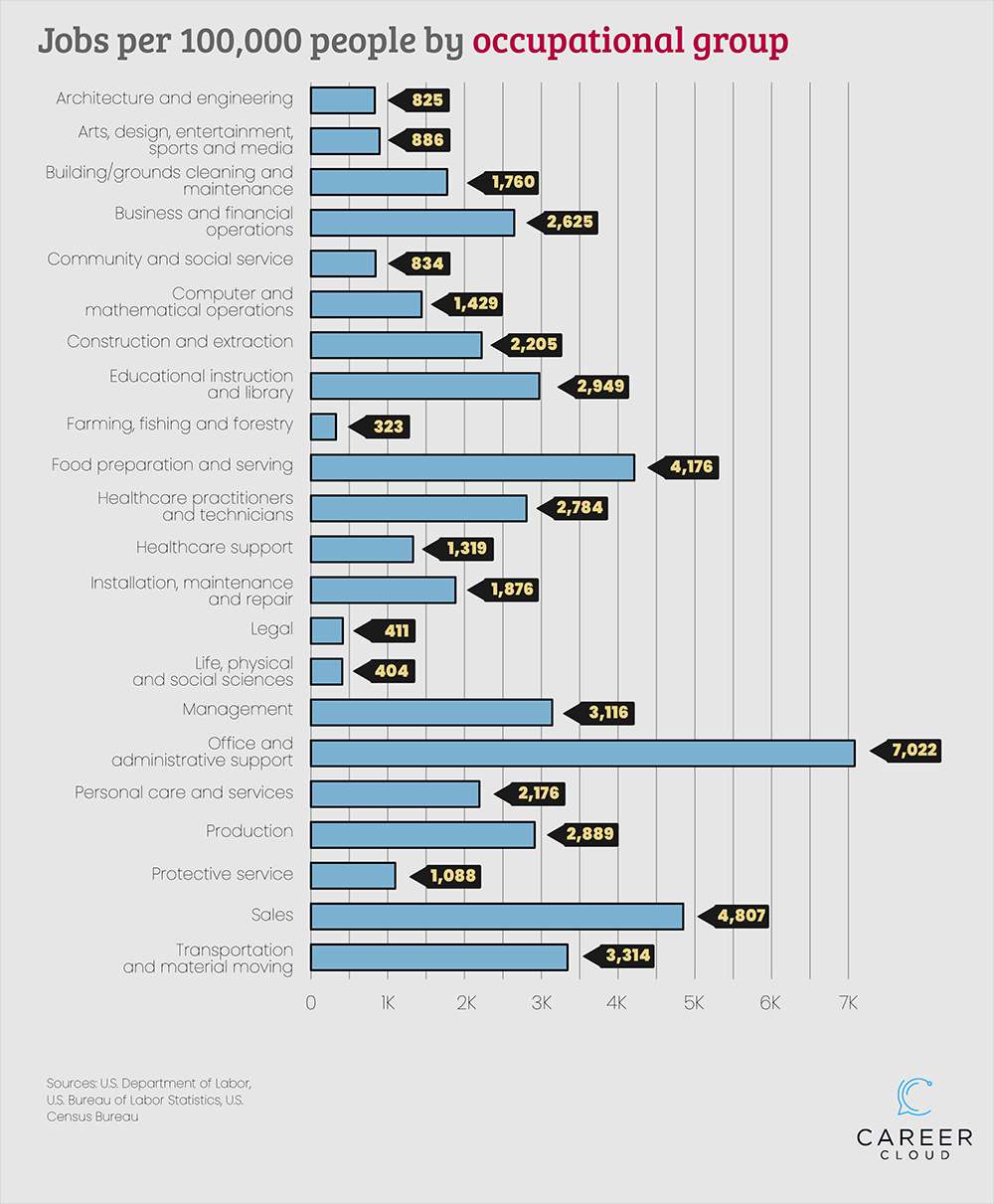
Office and administrative support jobs account for a diverse range of job types, including popular jobs like customer service representatives and slightly more niche jobs like desktop publishers. Similarly, jobs for software app developers will likely draw tons of applicants while mathematicians will have a tougher time finding any openings at all, though they both are classified in the same occupational group.
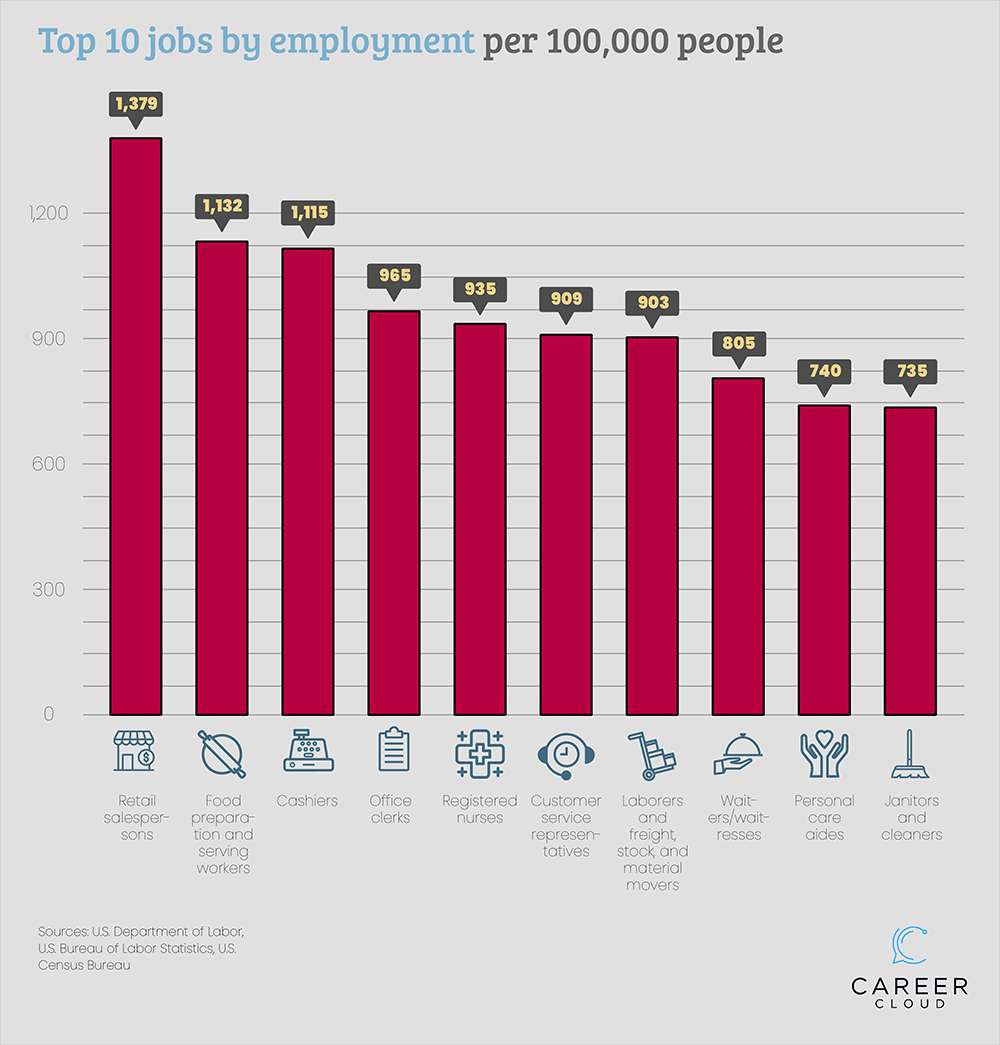
Which Jobs Are Most Competitive In Your State?
In every state, the most competitive occupational groups are either sales, food prep and service or building/grounds cleaning and maintenance. The only area in which the top job group isn’t one of those three is the District of Columbia, where legal jobs account for about three times more than any other occupational group.
Join The Break Community
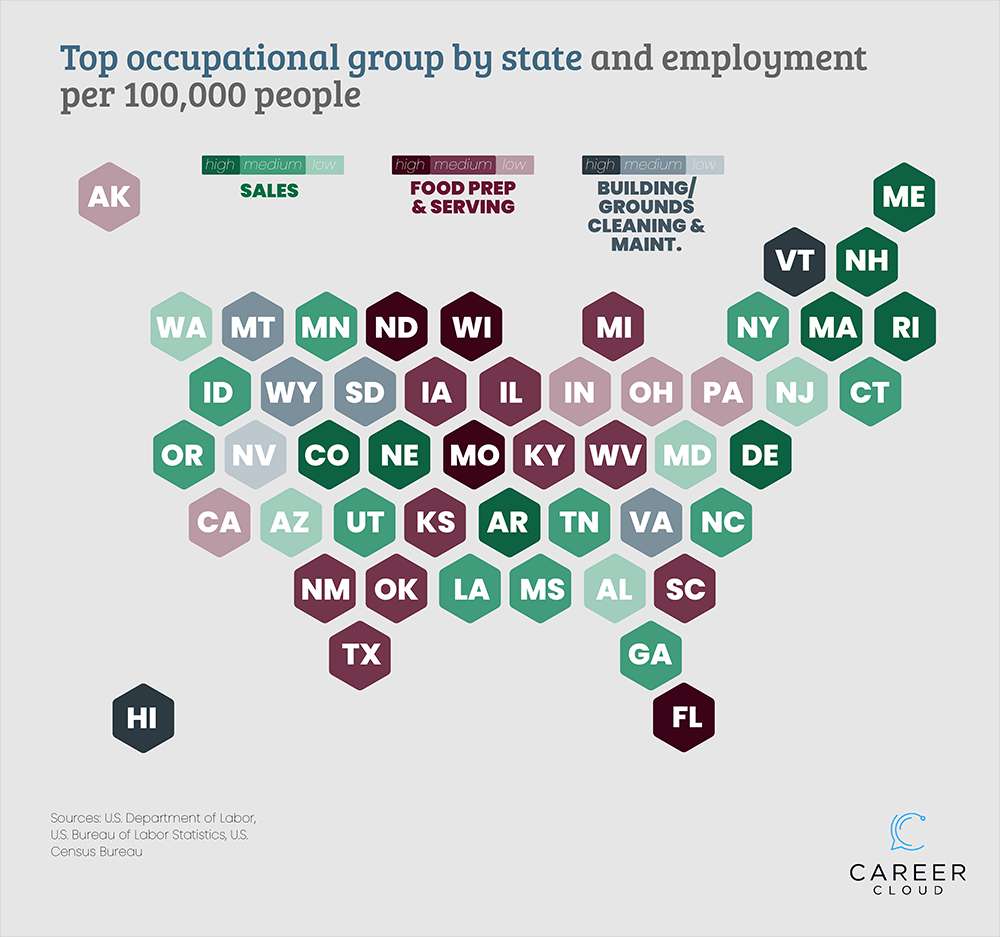
Similarly to overall U.S. statistics, the slate of most competitive jobs by state is dominated by a few roles — retail sales, food prep, cashiers, office clerks and registered nurses are all in the top 10 for almost every state.
In fact, in only three states, Indiana, D.C. and Kentucky, retail sales workers are not among the top three most competitive jobs. The next most competitive job based on how frequently it appears near the top of employment rates is cashier, followed by food prep and service worker.
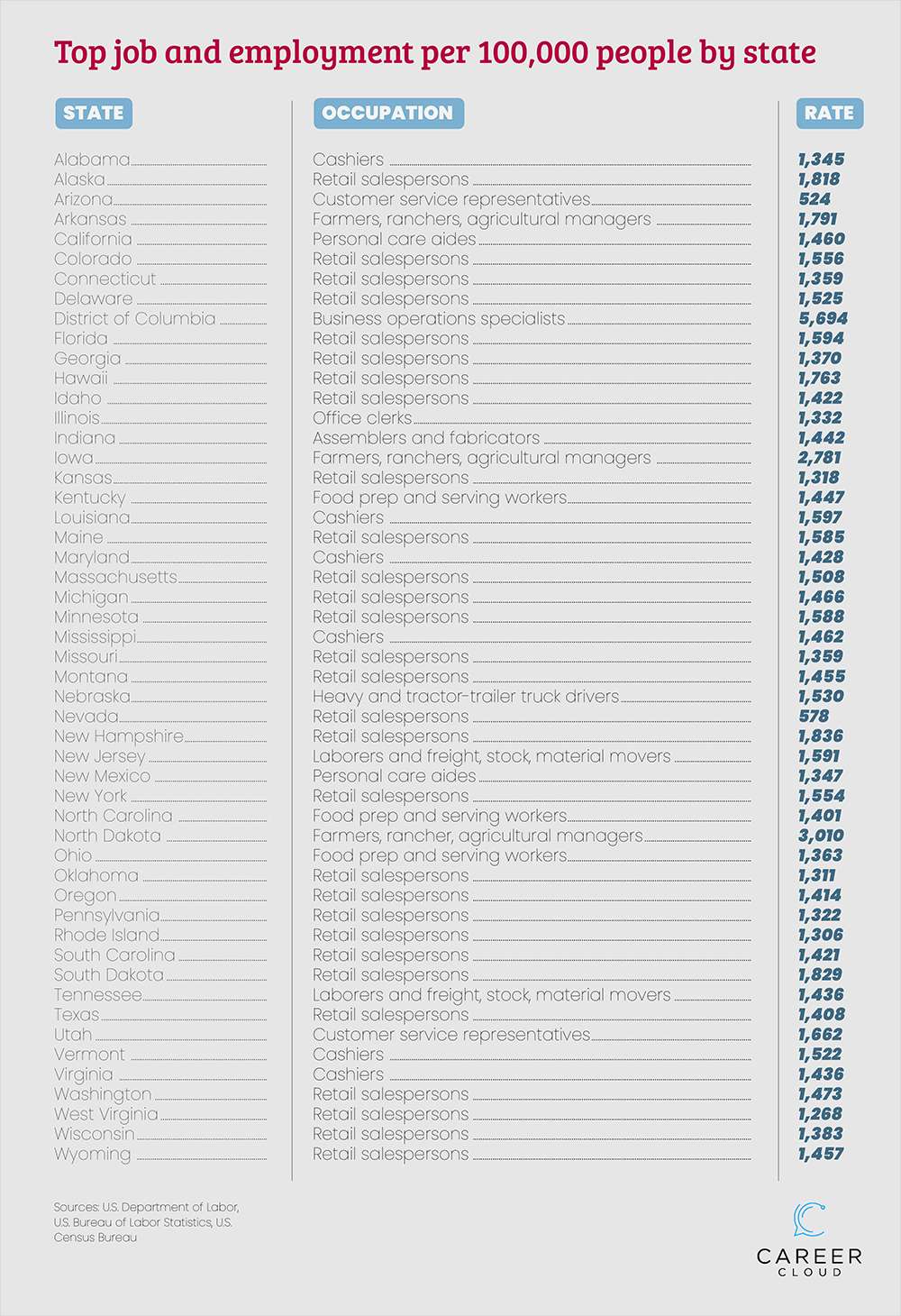
While these lists have many familiar entries, in a handful of states, there are some unique entries. For example, in Hawaii, two jobs are listed that don’t appear on any other states’ lists, while none of the most competitive jobs for the District of Columbia appear anywhere else.
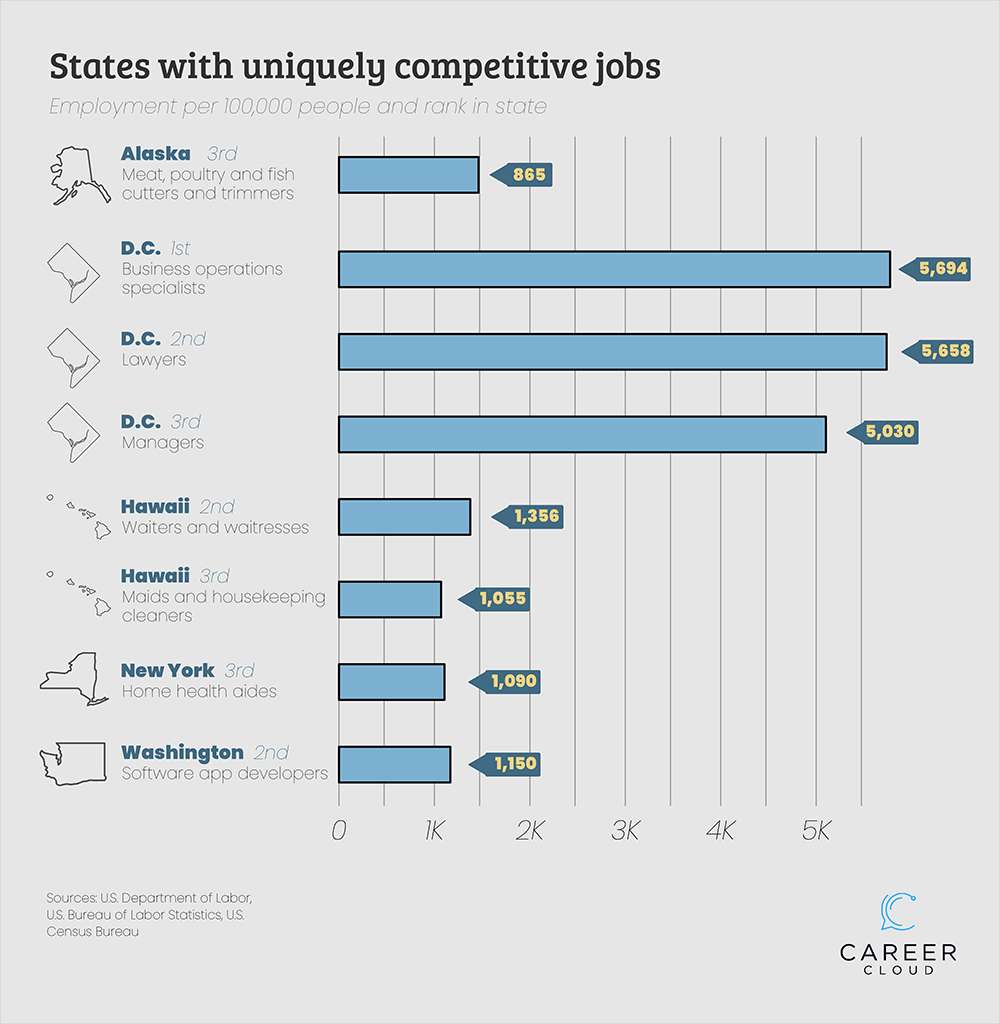
What’s Next?
Looking far past the end of the COVID-19 pandemic, which types of jobs are likely to become more competitive over the next several years? While the biggest jobs will largely remain in place, there are several that are expected to surge in demand.
The two occupations expected to see the most rapid growth rate are both related to the expansion of renewable energy; solar installers and wind turbine technicians should see employment grow by upwards of 35%. Another climate change-related occupation, forest fire inspector and prevention specialist, will enjoy 13% growth.
Sixteen of the 25 jobs with the fastest growth rates are in medicine, physical therapy, and psychology, while a few other STEM-related roles also should become considerably more competitive over the next several years.

5 Tips for Job Seekers During COVID-19 to Stand Out
While unemployment rates remain high as a result of the COVID-19 pandemic, it’s perhaps never been more important for job seekers to ensure they stand out from other applicants in a job search that’s likely to be entirely or mostly online. Here are a few tips that should help ensure you remain top of mind for hiring managers and recruiters:
Consider your presentation
This is especially important for interviews conducted over video conferencing platforms. While your family and friends might not care too much that they can see the dirty laundry in the background of the shot or that the lighting you’re using makes you look a bit scary, hiring managers definitely will. Think of it this way: A few years ago, if you were planning to go on job interviews, you’d probably get a new interview outfit or at least make sure your grooming and wardrobe were the best they could be; that same energy should go into make sure the spot you’re interviewing from presents you in the best light.
Rethink your resume
We know that most major companies use ATS platforms to filter resumes, and companies of all stripes are increasing use of these tools because of the pandemic. Consider customizing your resume for the job opening by ensuring that the text of your resume mirrors specific words and phrases that appear in the job posting. Resume writing services can help you take an objective look at how you present yourself, your goals and your experience.
Focus on flexibility
The economy as a whole is in a state of upheaval, but some industries have been harder hit than others. It’s reasonable to think that the specialized skills you gained in one particular field can only be used for jobs in that area, but that’s usually not the case. A good example would be someone with years of experience in the restaurant industry, as food service is among the hardest-hit sectors thanks to lockdowns. It might not be realistic to think you’ll be able to get a comparable restaurant job, but think about the skills you gained there that can apply in virtually any industry — soft skills like time management and communication but also hard skills like quickly learning new point-of-sale systems or menu items.
Cast a narrow net
The quickest way to become overwhelmed in any job search is by applying to any role that seems remotely in your wheelhouse. But this can be counterproductive, and doing some research into which jobs and companies are the best fit for your skills can be the difference between a demoralizing slog and an energizing job search.
To explore where employers are posting jobs, check out the best job posting sites.
Don’t forget the old ways
Just because the hiring process is likely to look different than it might have a few years ago doesn’t mean that the advice of yesteryear is outdated. Networking has always been important, and it remains so, perhaps even more now that hiring managers are often unable to get the sense of someone in person. Also, the often-artificial nature of virtual communication methods like video chat make it even more important to make an emotional connection with an interviewer through simple techniques like sending a thank-you email after a chat.
Conclusion
In any field, setting yourself apart from the masses is crucial. But as we’ve seen, not all types of jobs are equal when it comes to just how many applications any one opening is likely to draw. Whether your skills are one of your state’s high-competition fields or a role that’s expected to draw more and more applications in the future, it’s important to do everything you can to ensure your resume stands out.
About This Report
As mentioned, we used employment data reported by the U.S. Bureau of Labor Statistics, a branch of the U.S. Department of Labor. Employment figures reported by the BLS and projected growth rates reported by the labor department were compared to population data and projections reported by the U.S. Census Bureau and federal Centers for Disease Control and Prevention (CDC) to create the analysis.














